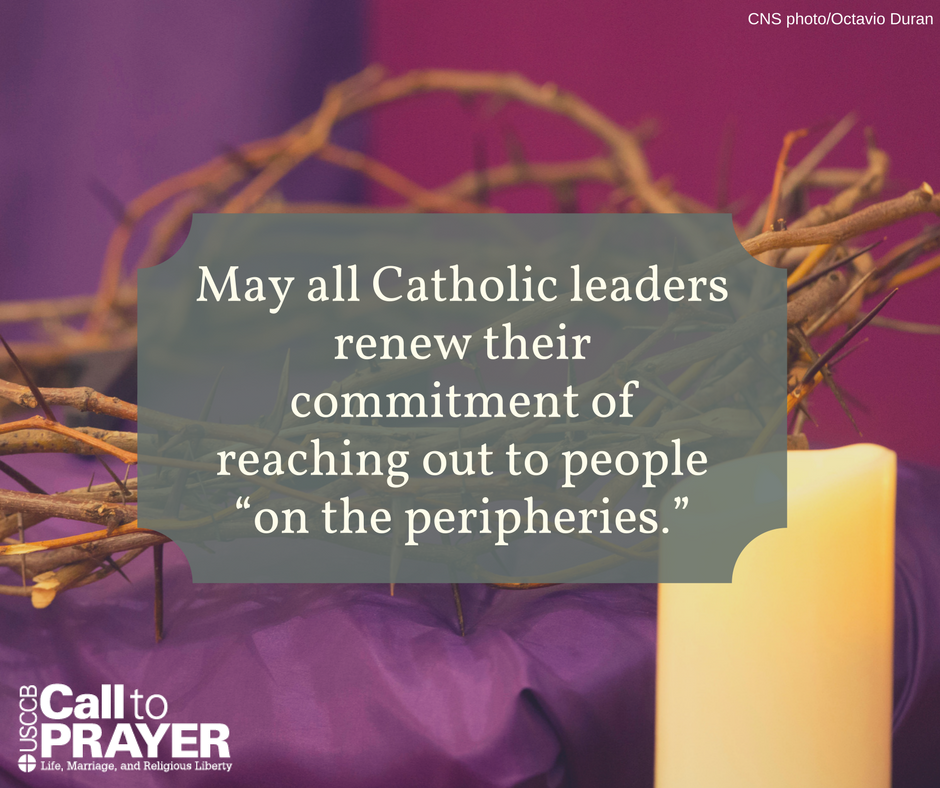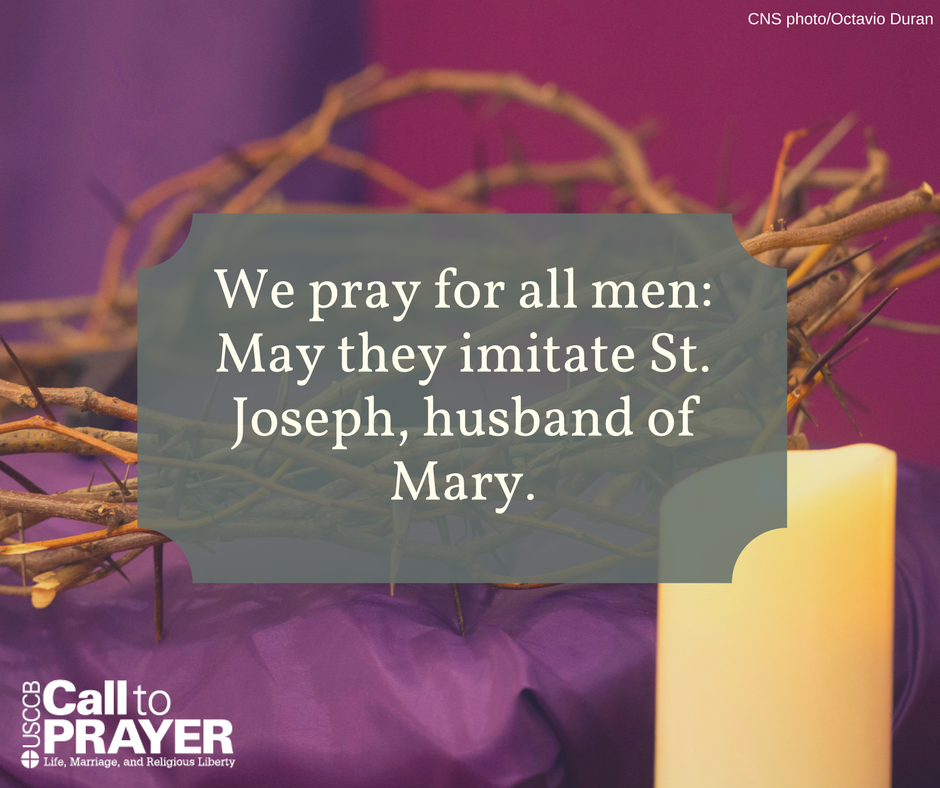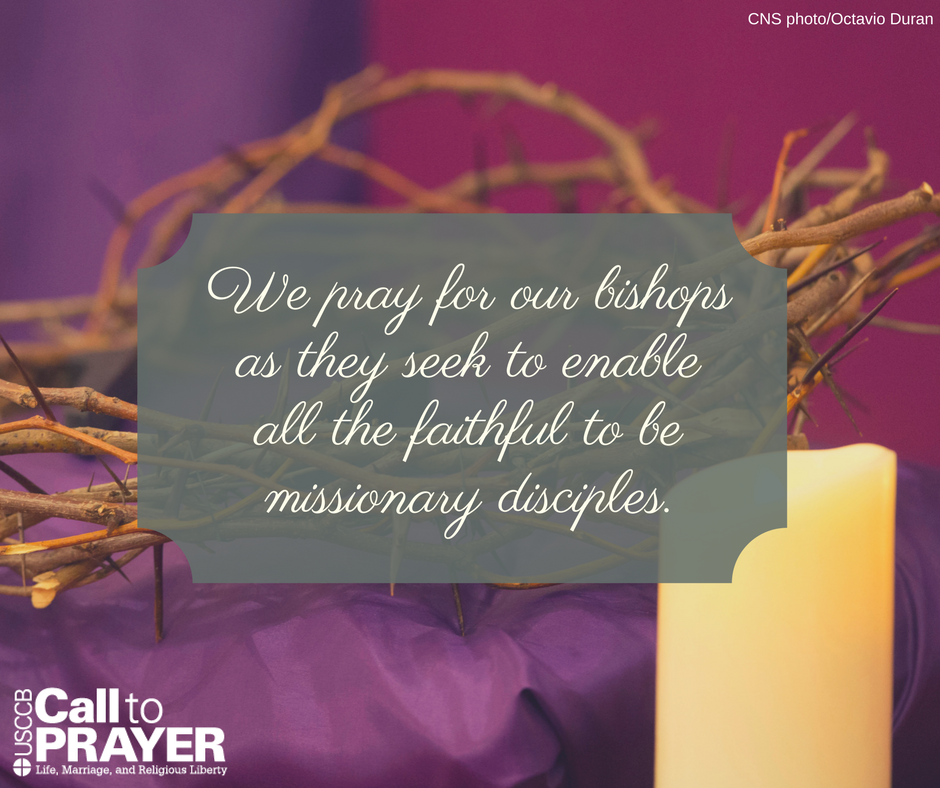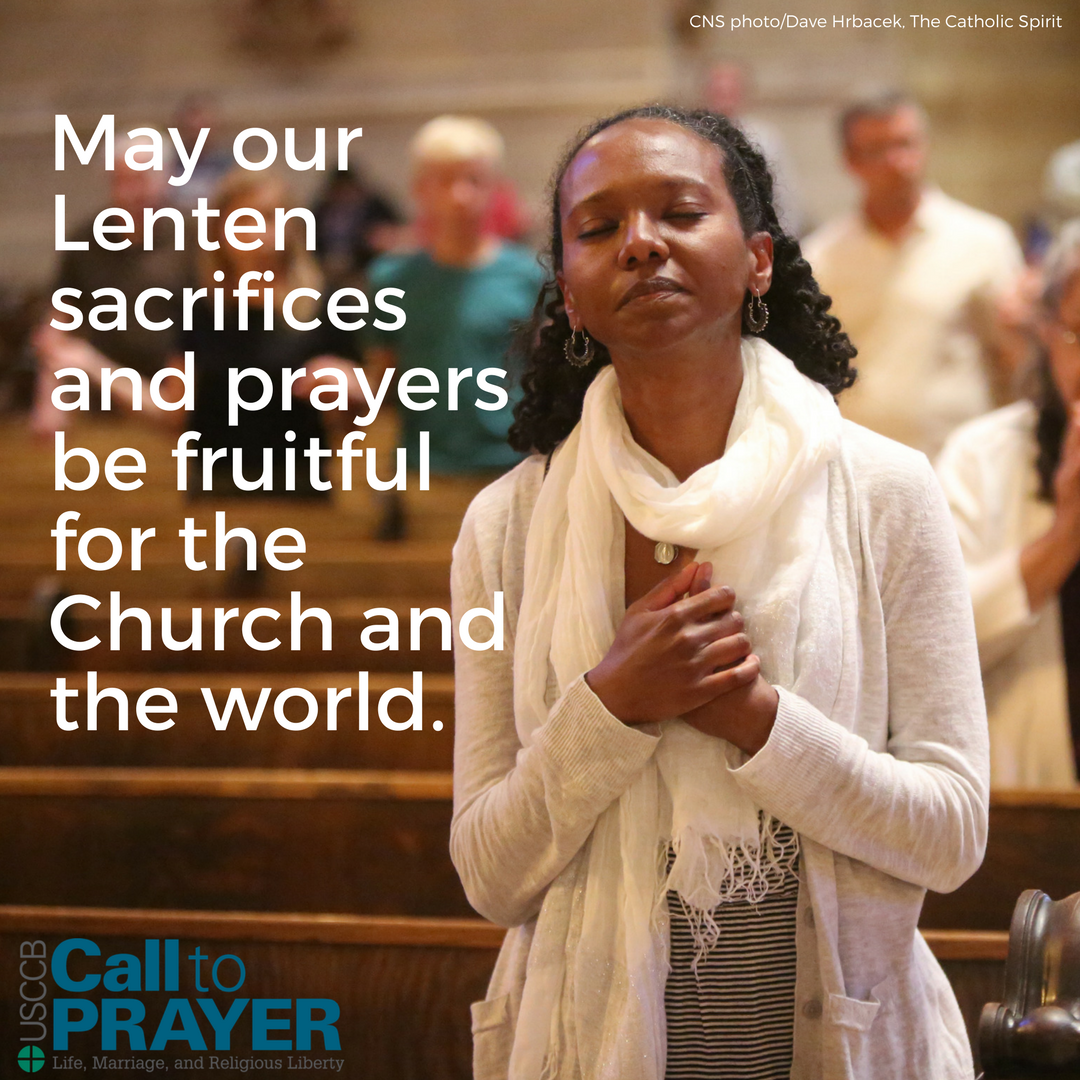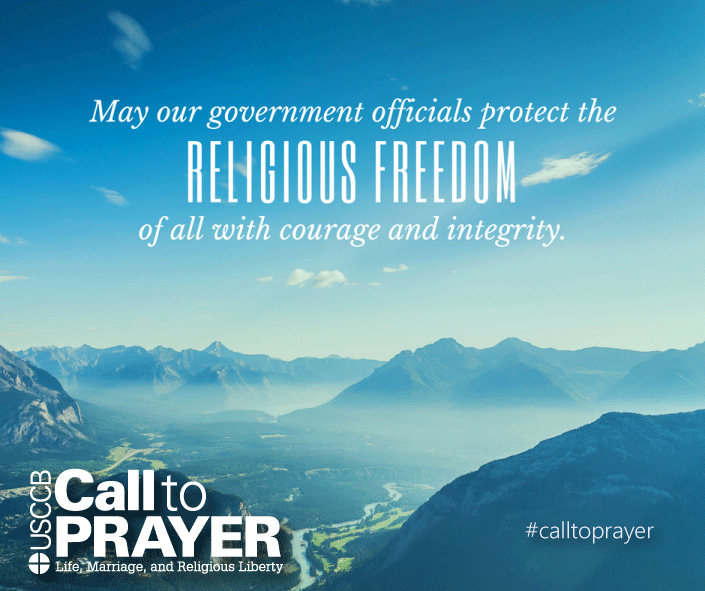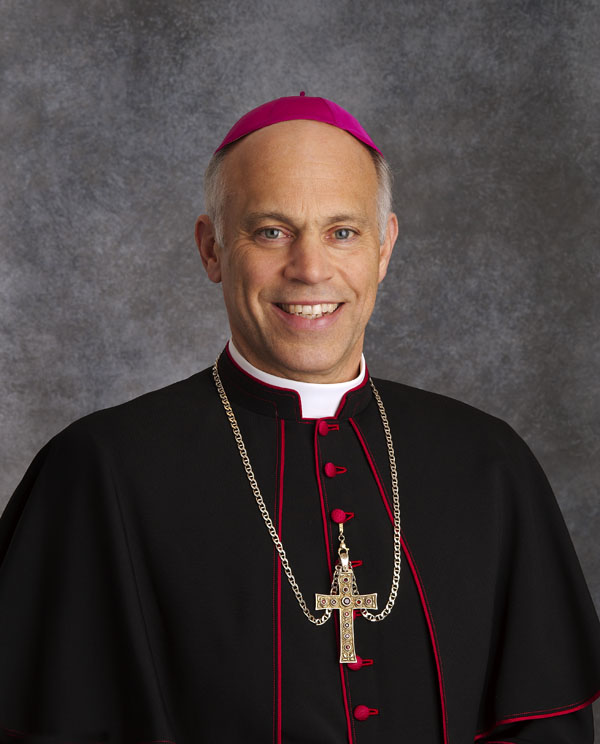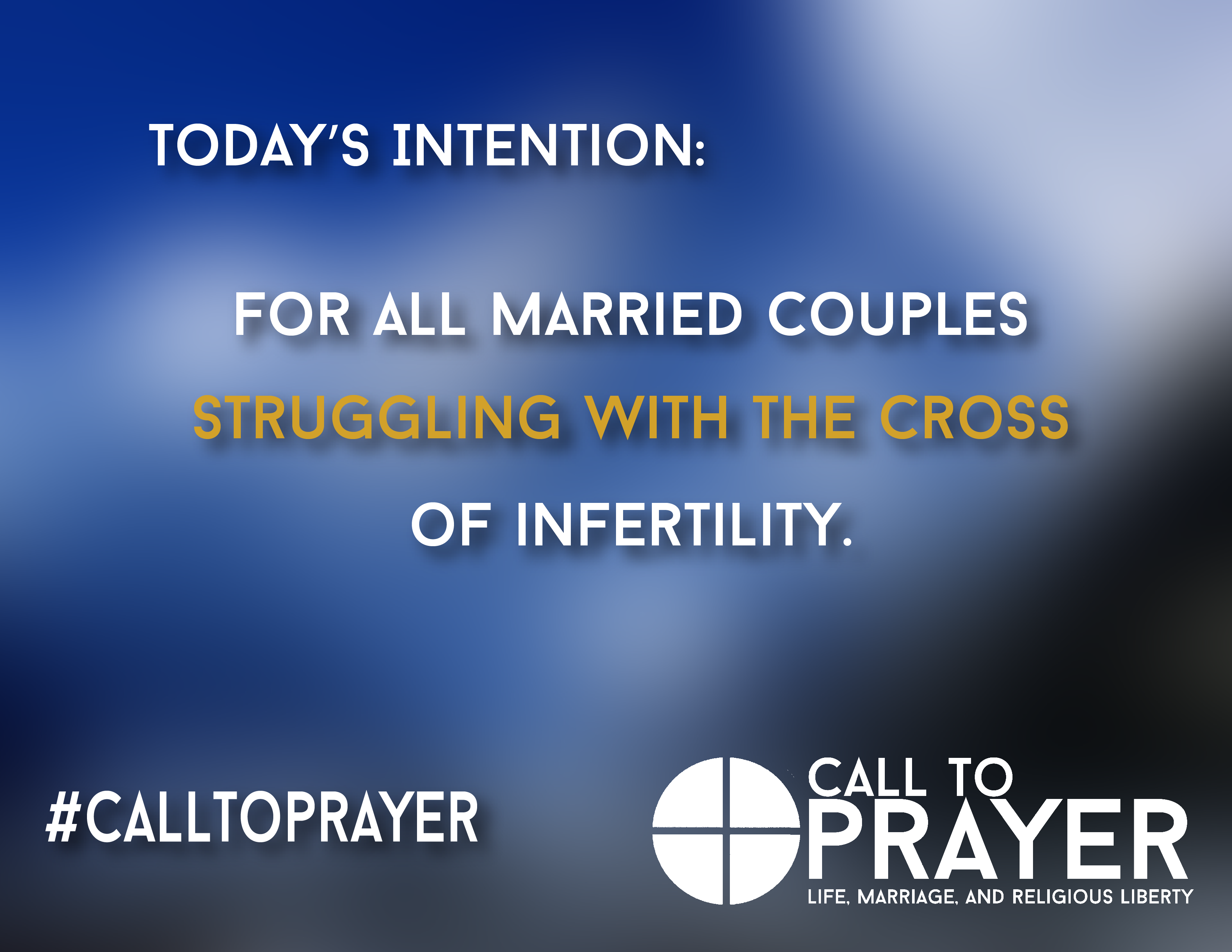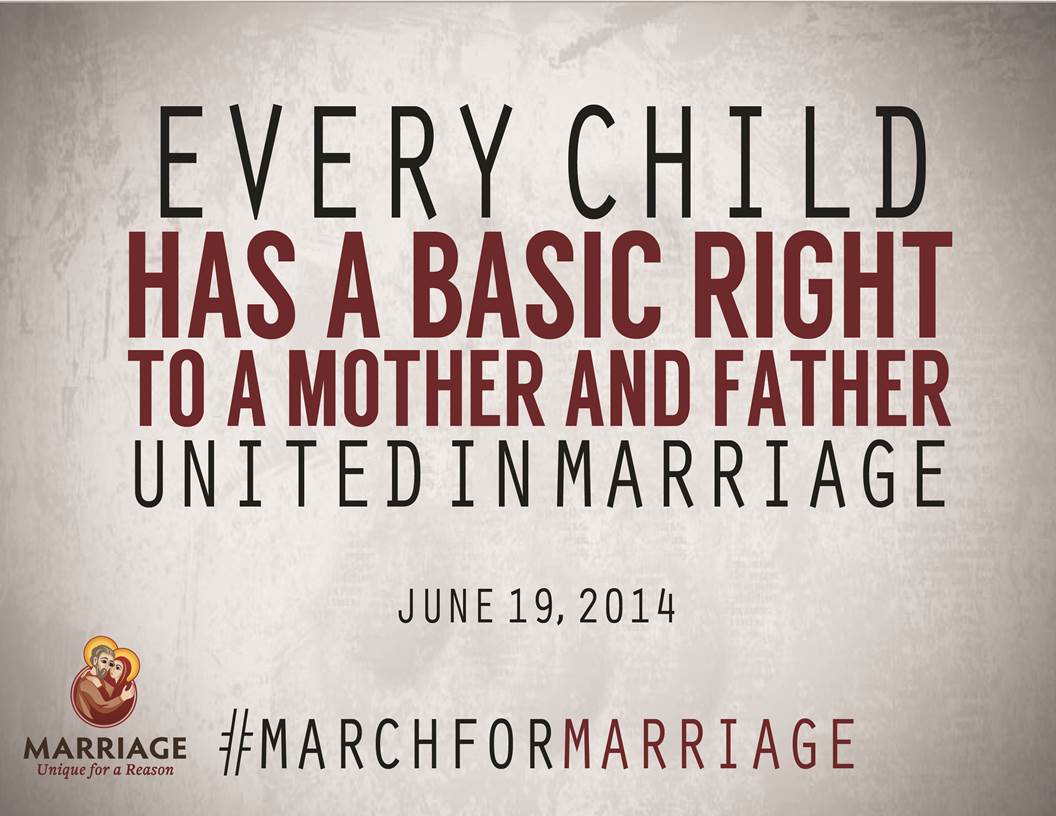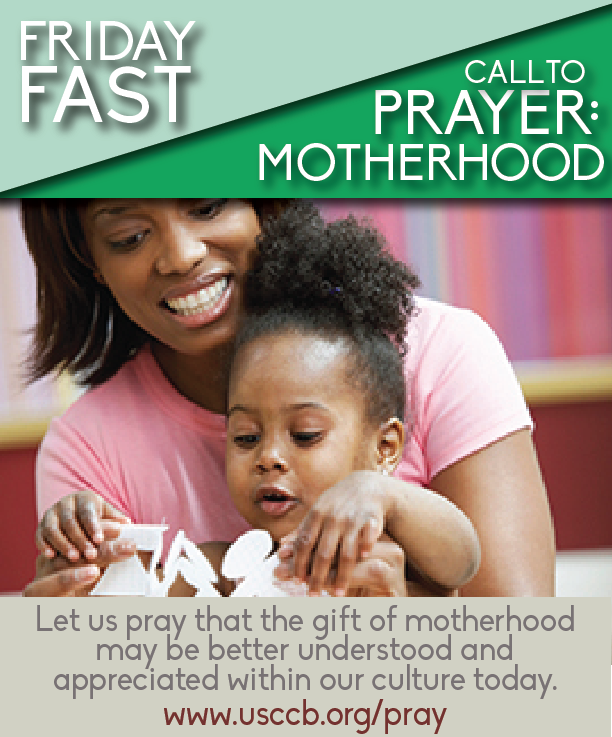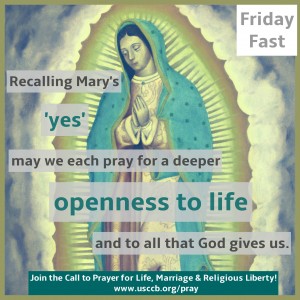Action Alert: Tell Congress that the ERA hurts Women and the Unborn
Please join your voice to an action alert from our colleagues in the Secretariat for Pro-Life Activities!
The ERA is not really about equal rights for women. Check out the USCCB fact sheet on this legislation!
Archive
Call to Prayer: March 24, 2017
Archive
Call to Prayer: March 17th, 2017
Archive
Call to Prayer: March 10th, 2017
Archive
Call to Prayer: March 3rd, 2017
Archive
Call to Prayer: February 24, 2017
Archive
Call to Prayer: February, 17th, 2017
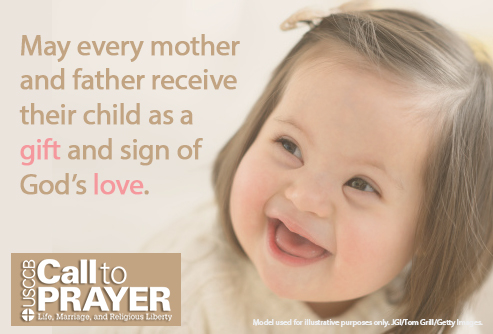
Archive
Archbishop Chaput 2016 Tocqueville Lecture
Archbishop Chaput, Chairman-Elect for the Committee on Laity, Marriage, Family Life and Youth at the USCCB, gave the Tocqueville Lecture at the University of Notre Dame on September 15th, 2016. The full text is available here. The middle section, reprinted here, examines the importance of a true understanding of human sexuality:
So, what does any of this have to do with sex, family and the liberty of the Church? I’ll answer the question this way.
I’ve been a priest for 46 years. During that time I’ve heard something more than 12,000 personal confessions and done hundreds of spiritual direction sessions. That’s a lot of listening. When you spend several thousand hours of your life, as most priests do, hearing the failures and hurts in people’s lives – men who beat their wives; women who cheat on their husbands; the addicts to porn or alcohol or drugs; the thieves, the hopeless, the self-satisfied and the self-hating – you get a pretty good picture of the world as it really is, and its effect on the human soul. The confessional is more real than any reality show because nobody’s watching. It’s just you, God and the penitents, and the suffering they bring with them.
As a priest, what’s most striking to me about the last five decades is the huge spike in people – both men and women — confessing promiscuity, infidelity, sexual violence and sexual confusion as an ordinary part of life, and the massive role of pornography in wrecking marriages, families and even the vocations of clergy and religious.
In a sense, this shouldn’t surprise. Sex is powerful. Sex is attractive. Sex is a basic appetite and instinct. Our sexuality is tied intimately to who we are; how we search for love and happiness; how we defeat the pervasive loneliness in life; and, for most people, how we claim some little bit of permanence in the world and its story by having children. The reason Pope Francis so forcefully rejects “gender theory” is not just because it lacks scientific support — though it certainly has that problem. Gender theory is a kind of metaphysics that subverts the very nature of sexuality by denying the male-female complementarity encoded into our bodies. In doing that, it attacks a basic building block of human identity and meaning — and by extension, the foundation of human social organization.
But let’s get back to the confessional. Listening to people’s sexual sins in the Sacrament of Penance is hardly new news. But the scope, the novelty, the violence and the compulsiveness of the sins are. And remember that people only come to Confession when they already have some sense of right and wrong; when they already understand, at least dimly, that they need to change their lives and seek God’s mercy.
That word “mercy” is worth examining. Mercy is one of the defining and most beautiful qualities of God. Pope Francis rightly calls us to incarnate it in our own lives this year. Unfortunately, it’s also a word we can easily misuse to avoid the hard work of moral reasoning and judgment. Mercy means nothing – it’s just an exercise in sentimentality – without clarity about moral truth.
We can’t show mercy to someone who owes us nothing; someone who’s done nothing wrong. Mercy implies a pre-existing act of injustice that must be corrected. And satisfying justice requires a framework of higher truth about human meaning and behavior. It requires an understanding of truth that establishes some things as good and others as evil; some things as life-giving and others that are destructive.
Here’s why that’s important. The truth about our sexuality is that infidelity, promiscuity, sexual confusion and mass pornography create human wreckage. Multiply that wreckage by tens of millions of persons over five decades. Then compound it with media nonsense about the innocence of casual sex and the “happy” children of friendly divorces. What you get is what we have now: a dysfunctional culture of frustrated and wounded people increasingly incapable of permanent commitments, self-sacrifice and sustained intimacy, and unwilling to face the reality of their own problems.
This has political consequences. People unwilling to rule their appetites will inevitably be ruled by them — and eventually, they’ll be ruled by someone else. People too weak to sustain faithful relationships are also too weak to be free. Sooner or later they surrender themselves to a state that compensates for their narcissism and immaturity with its own forms of social control.
People too worried or self-focused to welcome new life, to bear and raise children in a loving family, and to form them in virtue and moral character, are writing themselves out of the human story. They’re extinguishing their own future. This is what makes the resistance of so many millennials to having children so troubling.[1]
The future belongs to people who believe in something beyond themselves, and who live and sacrifice accordingly. It belongs to people who think and hope inter-generationally. If you want a portrait of what I mean, consider this: The most common name given to newborn male babies in London for the past four years in a row is Muhammad. This, in the city of Thomas More.
Weak and selfish individuals make weak and selfish marriages. Weak and selfish marriages make broken families. And broken families continue and spread the cycle of dysfunction. They do it by creating more and more wounded individuals. A vast amount of social data shows that children from broken families are much more likely to live in poverty, to be poorly educated, and to have more emotional and physical health issues than children from intact families. In other words, when healthy marriages and families decline, the social costs rise.
The family is where children discover how to be human. It’s where they learn how to respect and love other people; where they see their parents sacrificing for the common good of the household; and where they discover their place in a family story larger than themselves. Raising children is beautiful but also hard work. It’s a task for unselfish, devoted parents. And parents need the friendship and support of other likeminded parents. It takes parents to raise a child, not a legion of professional experts, as helpful as they can sometimes be.
Only a mother and father can provide the intimacy of maternal and paternal love. Many single parents do a heroic job of raising good children, and they deserve our admiration and praise. But only a mother and father can offer the unique kind of human love rooted in flesh and blood; the kind that comes from mutual submission and self-giving; the kind that comes from the complementarity of sexual difference.
No parents do this perfectly. Some fail badly. Too often the nature of modern American life helps and encourages them to fail. But in trying, parents pass along to the next generation an absolutely basic truth. It’s the truth that things like love, faith, trust, patience, understanding, tenderness, fidelity and courage really do matter, and they provide the foundation for a fully human life.
Of course some of the worst pressures on family life come from outside the home. They come in the form of unemployment, low pay, crime, poor housing, chronic illness and bad schools.
These are vitally important issues with real human consequences. And in Catholic thought, government has a role to play in easing such problems – but not if a government works from a crippled idea of who man is, what marriage is, and what a family is. And not if a government deliberately shapes its policies to interfere with and control the mediating institutions in civil society that already serve the public well. Yet this could arguably describe many of the current administration’s actions over the past seven years.
The counterweight to intrusive government is a populace of mature citizens who push back and defend the autonomy of their civil space. The problem with a consumer economy though – as Christopher Lasch saw nearly 40 years ago — is that it creates and relies on dependent, self-absorbed consumers. It needs and breeds what Lasch called a “culture of narcissism,” forgetful of the past, addicted to the present and disinterested in the future. And it’s hard to argue with the evidence. In his inaugural speech of 1961, John F. Kennedy could still tell Americans, quite confidently, to “ask not what your country can do for you, but what you can do for your country.” Today I wonder how many of us might find his words not only naïve and annoying, but an inversion of priorities.
If we want strong families, we need strong men and women to create and sustain them with maturity and love. And as a family of families, the Church is no different. The Church is strong when her families and individual sons and daughters are strong; when they believe what she teaches, and then witness her message with courage and zeal.
She’s weak when her people are too tepid or comfortable, too eager to “fit in” or frankly too afraid of public disapproval, to see the world as it really is. The Church is “ours” only in the sense that we belong to her as our mother and teacher in the family of God. The Church does not belong to us. We belong to her. And the Church in turn belongs to Jesus Christ who guarantees her freedom whether Caesar likes it or not.
The Church is free even in the worst persecution. She’s free even when many of her children desert her. She’s free because God does exist, and the Church depends not on numbers or resources but on her fidelity to God’s Word. But her practical liberty — her credibility and effectiveness, here and now, in our wider society — depends on us. So we should turn to that issue in the time remaining.
Archive
Intern Post: The Mercy of Indissolubility
Growing up with three brothers, I remember a lot of forced apologies being exchanged back and forth between us. My parents would make us say the words before we were actually ready to apologize for (or forgive) whatever nastiness was inflicted that day. But however hurt or angry we were at the moment, there was never a question in our minds about whether we loved one another. We belonged to each other and wouldn’t have had it any other way. Being family and loving one another went hand-in-hand.
Love sees beyond what is broken, rude, selfish, or mean in the other person’s action and reaches out a hand to heal the relationship. By making my brothers and me practice forgiveness in the everyday offenses of life, my parents were leading us to understand mercy: it makes things right between us.
Throughout the Old Testament we see a cycle of betrayal and mercy played out between Israel and the Lord. Over and over, Israel abandons God for their own desires, but the Lord continually draws her back to himself because he chose her and he is faithful to the covenant he made. In the book of Hosea in particular, the relationship of a married couple is used to reveal the steadfastness of God’s love for Israel. No matter what she does, He remains faithful.
A sacramental marriage helps those who witness it to understand God’s fidelity to his people. Indissolubility is a gift of mercy, because it makes the relationship of the couple true to what love is: a complete gift of oneself that can’t be taken back. A person in love does not promise their beloved the next three years; they promise forever![1] “The gift of indissolubility means that despite the vicissitudes and suffering that come with human failure and sin, the sacramental marriage bond remains an abiding source of mercy, forgiveness, and healing.”[2] To deny the indissolubility of marriage would be an affront against the sacrament of marriage because it would deny the reality of grace and its power to heal and perfect a person.
I came across a beautiful reflection about marriage recently on a blog site. A woman was reflecting on her experience of learning to have mercy on her husband who was struggling with clinical depression. She said, “Through mercy, God taught me to love my husband as we all deserve to be loved—with a love devoid of self, thinking only of the good of the other person.”[3] While her husband was sick, she, “picked up his cross for him, as Jesus does for us, and bore his malaise and withdrawal in loving silence.” By showing mercy rather than demanding justice, the couple was able to maintain peace and goodwill during his illness. Mercy itself is not a cure for depression, but it helped this couple to preserve their relationship in a difficult time. The wife realized that she needed to be kind and selfless, and not seek justice but rather have mercy, and finally when she did that she found, “I no longer cared about justice.”
It can be said of the practice of reconciliation that it “washes away small offenses, but it also protects from great offenses. Pardon confers a habitus of communion.”[4] Mercy towards siblings, in my case, and a husband in the case of the blog contributor is an expression of a disposition toward communion. It is a desire to be united to the other person, even after they have hurt you. A married couple that frequently seeks and offers mercy reinforces their “togetherness” or communion so that when serious trials arise they have already practiced drawing towards one another. The indissoluble bond of marriage not only calls a couple to be merciful toward each other, but indissolubility also reveals God’s own mercy, because when he binds two people together in the sacrament, he gives them the graces they need to live it out.
[1] There is a new concept about marriage out there these days called a “wed-lease,” which turns marriage into something more like a business contract: https://www.washingtonpost.com/opinions/a-high-divorce-rate-means-its-time-to-try-wedleases/2013/08/04/f2221c1c-f89e-11e2-b018-5b8251f0c56e_story.html. This is not true to what love is.
[2] Healy, N. (2014). The Merciful Gift of Indissolubility. Communio International Catholic Review, 41.2. Retrieved from http://www.communio-icr.com/files/healy41-2.pdf
[3] “Ode to Feminine Genius: A Merciful Woman.” Catholic Sistas. Aug. 28, 2014. http://www.catholicsistas.com/2014/08/ode-feminine-genius-merciful-woman/
[4] Laffitte, J.(2015). The Choice of the Family. New York: Image, p. 143.
Written by the Spring Intern in the Promotion and Defense of Marriage Secretariat.
Archive
Australian Bishops Speak Out: Don’t Mess with Marriage
The Catholic bishops of Australia are rallying against the increasing acceptance of same-sex “marriage” and the pressure to adopt it. Their Pastoral Letter is named “Don’t Mess with Marriage”.
Archbishop Anthony Fisher, OP wrote about it to his people. Bishop Gregory O’Kelly, SJ of Port Pirie added his own letter to the mix, saying it simply and clearly:
“A pear is not an apple. Same-sex marriage is not the same as a marriage between a man and a woman. The opinions of media personalities, or politicians, or a parliamentary vote can do what they wish, but no matter how much they say it, a pear remains a pear and does not change into an apple. Equally same-sex marriage is not identical with a marriage between a man and a woman. In the Christian tradition marriage has the two aspects of the mutual support and love of a man and a woman, and the openness to procreation, to bearing life. That is what the word “parent” means in its Latin origin, a bearer, a creator, a life-giver. No matter how you use the word “marriage”, a same-sex union does not have the fundamental possibility of parenting. True marriage remains a vowed union between a man and a woman, a commitment for life, to provide a context in which new life might be born. The nature of marriage cannot be altered by the vote of politicians; it is not their area, it is the plan of God for the natural order.”
Archive
Bishop Conley: Martyrs, Witnesses and Public Life
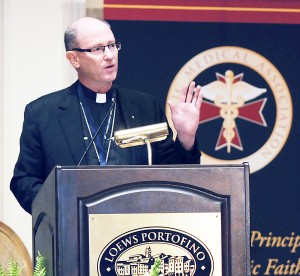
- Bishop James D. Conley of Lincoln, Neb., discusses the key to evangelization Sept. 27 during the Catholic Medical Association’s 83rd annual educational conference in Orlando, Fla. Bishop Conley is the association’s newly appointed spiritual adviser. (CNS photo/Jacque Brund) See CMA-ROUNDUP Oct. 1, 2014.
This past March, Bishop Conley of Lincoln, Nebraska gave an address for the “Catholics in the Capitol” annual Legislative Advocacy Day at the Nebraska State Capitol. It is entitled: “Martyrs, Witnesses and Public Life: Catholics at the Capitol”
Here are a few sections from his address that are pertinent to the work of the USCCB in promoting and defending marriage. He says, “The freedom to practice the faith is threatened by aggressive unchecked secularism, which stops at almost nothing to establish what Pope Benedict XVI called the ‘dictatorship of relativism.’ Relativism today is veiled by words like ‘tolerance’ and ‘non-discrimination’ and ‘progressivism.'” Indeed, the truth about marriage is currently being portrayed as bigoted or discriminatory.
Bishop Conley notes, “Today, our lives are not threatened in the state of Nebraska. But our liberties are. But in our state, faithful Christians face threats to their livelihood, to the education of their children, and to their family life.” These will only continue and become more serious as time goes by if we do not have the courage to stand up for our religious freedom now.
He reminds us that it is the call of the laity to bring Christ into the public sphere. “The Second Vatican Council said that your [lay] task is to ‘animate the temporal order’ with the Spirit of Jesus Christ. This means that our civil laws should reflect truth: the truth about the dignity of every human person; the truth about the sovereignty of families; the truth about the rights of children, and the disabled, and the elderly.” Catholic laypersons cannot sit on the sidelines on the debate about marriage.
Marriage is part of the common good for society. Bishop Conley notes, “Promoting human dignity is the common good. Promoting the family is the common good. Protecting truth and preserving justice is why we make law.”
And finally, Bishop Conley reminds us that we are in a spiritual battle with demons, “minions of the evil one,” and must fight for the good of all souls, including those who disagree with us. “We need to remember that those who disagree with us are created by God for salvation with him—and we are called to be missionaries to them, in order to invite them to a transformative religious relationship with Jesus Christ.”
Amen!
Archive
USCCB Amicus Brief
On April 2, 2015, the USCCB submitted an amicus curiae brief with the Supreme Court in Obergefell v. Hodges, supporting the right of states to define marriage as the union of one man and one woman.
The basic arguments of the brief are as follows:
- The Catholic Bishops support the legal definition of marriage as the union of one man and one woman out of love, justice, and concern for the common good
- When it uniquely reinforces the union of one man and one woman, the law furthers the interests and well-being of children.
- When it uniquely reinforces the union of one Man and one Woman, the law furthers the interests and well-being of mothers and fathers.
- The legal definition of marriage as the union of one man and one woman is not based on hatred, bigotry, or “animus” or any other impermissible purpose or classification.
- When it draws distinctions based on conduct rather than status or inclination, the law does not reflect hatred, bigotry, or “animus.”
- When it treats one type of conduct differently from conduct with very different practical consequences, the law does not reflect hatred, bigotry, or “animus.”
- When it reinforces norms that happen to correspond with religious beliefs, the law does not impermissibly endorse religion
- When it declines to specially reinforce a particular relationship between persons, the law does not thereby “ban” that relationship or make it “illegal.”
- A holding that the unique affirmation of man-woman marriage is grounded in hatred, bigotry, or “animus” would needlessly create Church-State conflict for generations to Come.
Archive
Archbishop Cordileone Responds to Recent Federal Rulings
Check out the press release from the USCCB about the recent rulings on marriage in federal courts. As Chairman of the Subcommittee on the Promotion and Defense of Marriage, Archbishop Cordileone reminds us, “Recent court decisions on marriage in no way deter our efforts to promote the truth about marriage – a truth that no court decision can ever undo.”
Archive
Friday Fast: July 25
Reflection: Tradition holds that Saints Joachim and Anne (whose feast day is July 26th) experienced a long period of infertility before conceiving Mary, the mother of Christ. We remember Sarah, Abraham’s wife, and Hannah, in the book of Samuel, as other examples of faithful people who longed for children. May couples who are struggling with infertility be blessed with hope, peace, and community as they live out their vocation to marriage.
Sometimes, the charting involved in Natural Family Planning can help to identify sources of infertility. It’s NFP Awareness Week, so we encourage you to check it out!
Saints Joachim and Anne, Grandparents of Jesus, pray for us!
Archive
Colorado Bishops Respond to Hobby Lobby case
The bishops of Colorado joined in a statement after the recent Supreme Court Hobby Lobby case. They say,
“We are hopeful that today’s decision will cast a favorable light on the ongoing non-profit cases still making their way through the legal process. The Church has an obligation to serve, and therefore, it needs the freedom to serve without government coercion of conscience and intrusion into religious beliefs. We encourage all people of good will to continue to pray for the protection of religious freedom in every sector of our society as guaranteed by the first amendment.”
We encourage you to read Bishop Aquila’s pastoral letter on the Family as well.
Archive
Oregon Update
The SCOTUS has determined not to block Oregon’s same-sex “marriages”.
Archive
March for Marriage 2014
The second March for Marriage will be held in Washington, D.C. on June 19, 2014. This is a great opportunity to visibly and powerfully demonstrate your support of the true definition of marriage as a unique bond between a man and a woman.
The March begins with a Rally from 11 a.m. to 1 p.m. on the grounds of the Capitol before going to the Supreme Court. Archbishop Cordileone is one of the featured speakers.
The details for the event, including information about the “virtual march”, lobbying, and the gala that evening are available at www.marriagemarch.org.
Archive
Friday Fast: May 9
Intention: Let us pray that the gift of motherhood may be better understood and appreciated within our culture today.
Reflection: It is very fitting that we celebrate Mother’s Day during the month dedicated to the most perfect mother, the Blessed Virgin Mary. A mother plays an irreplaceable role in a child’s life. Without our mothers, we would not have been born and therefore would not have the capacity to live out our Catholic faith. In the words of St. John Paul II, “it is precisely those born of earthly mothers…who receive from the Son of God the power to become ‘children of God’ (Jn 1:12)…The history of every human being passes through the threshold of a woman’s motherhood (no 19).”
It is interesting to note that the Church is sometimes referred to as a mother. Just as a mother gives life to her children, so also the Church “brings forth to a new and immortal life the sons who are born to her in baptism (Lumen Gentium, no 64).” Mary, the most perfect mother, is the archetype, or model for the Church because of her unfailing belief and obedience to God’s will. “The Church indeed, contemplating [Mary’s] hidden sanctity, imitating her charity and faithfully fulfilling the Father’s will, by receiving the word of God in faith becomes herself a mother (LG, no 64).”
Did You Know? In 1965, Pope Paul VI wrote an Encyclical entitled “Mense Maio” (Month of May). In this document, he explained that “Since Mary is rightly to be regarded as the way by which we are led to Christ, the person who encounters Mary cannot help but encounter Christ likewise.”
Archive
Friday Fast: May 2, 2014
Intention: Recalling Mary’s “yes,” may we each pray for a deeper openness to life and to all that God gives us.
Reflection: May is known as the month of Mary! There are many reasons to honor Our Lady, but perhaps one of the most basic is her fiat—her “let it be” in response to God’s will. Mary’s total receptivity is a perfect example of the openness to God we are all called to embrace.
On the Feast of the Annunciation, Pope Francis reminded us that “salvation cannot be bought and sold; it is given as a gift, it is free.” Thus, “since it cannot be bought, in order for this salvation to enter into us we need a humble heart, a docile heart, an obedient heart like Mary’s.”
Through Mary we encounter Christ, who expressed God’s great love for each of us through the sacrifice of his life on the Cross in total obedience to the Father. Through the example of Christ and Mary we can see that the freedom of salvation lies in perfect obedience and receptivity to God.
Did You Know? May is a special opportunity to grow in Marian devotion which leads us closer to Christ. Check out these pro-life rosary prayer intentions!
Archive
Friday Fast: April 11
Intention: We pray for a deeper understanding of what it means to be created male or female.
Reflection: During a recent morning meditation, Pope Francis reflected on the Book of Genesis. “The creation of man and woman is the masterpiece of creation,” the Pope explained. God “did not want for man to be alone: he wanted him to be with his companion, his companion on the journey.”
Here the Bible shows us a very important truth; man and woman are equal, but different. This sexual difference is actually complementary. It is through the existence of woman that we are able to fully appreciate the uniqueness of man and vice versa. An example of this aspect of difference and complementarity can be seen in beautiful paintings where two complementary colors are used. When brought together, the two different colors look more vibrant and unique than they would have looked separately. The same can be said of man and woman. In the words of Blessed John Paul II, “femininity in some way finds itself before masculinity, while masculinity confirms itself through femininity.”
Did You Know? In his Theology of the Body, Blessed John Paul II explained that “man became an image of God not only through his own humanity, but also through the communion of persons, which man and woman form from the very beginning.” Through marriage, a husband and wife are able to be a true communion of persons by giving themselves and receiving the other in unselfish love. In this way, a husband and wife have the unique ability to reflect Trinitarian Love.
